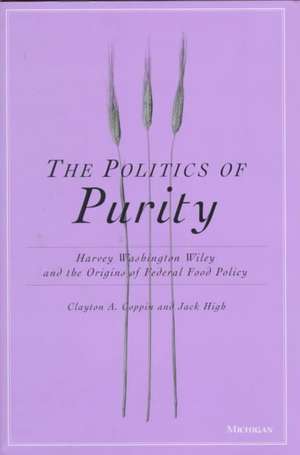The Politics of Purity: Harvey Washington Wiley and the Origins of Federal Food Policy
Autor Clayton Anderson Coppin, Jack C. Highen Limba Engleză Hardback – 20 mai 1999
Spearheaded by Harvey Washington Wiley, the Pure Food and Drugs Act of 1906 launched the federal regulation of food and drugs in the United States. Wiley is often lauded as a champion of public interest for bringing about a law that required healthful ingredients and honest labeling. Clayton Coppin and Jack High demonstrate, however, that Wiley was in fact surreptitiously allied with business firms that would benefit from regulation and moreover, that the law would help him build his government agency, the Federal Bureau of Chemistry.
Coppin and High discuss such issues as Wiley's efforts to assign the law's enforcement to his own bureau. They go on to expose the selectivity of Wiley's enforcement of the law, in which he manipulated commercial competition in order to reward firms that supported him and penalize those that opposed him. By examining the history of the law's movement, the authors show that, rather than acting in the public interest, Wiley used the Pure Food and Drugs Act to further his own power and success. Finally, they analyze government regulation itself as the outcome of two distinct competitive processes, one that takes place in the market, the other in the polity.
The book will interest scholars concerned with government regulation, including those in economics, political science, history, and business.
Clayton Coppin is a management consultant and historian, Koch Industries, Wichita. Jack High is Professor of Economics, George Mason University.
Coppin and High discuss such issues as Wiley's efforts to assign the law's enforcement to his own bureau. They go on to expose the selectivity of Wiley's enforcement of the law, in which he manipulated commercial competition in order to reward firms that supported him and penalize those that opposed him. By examining the history of the law's movement, the authors show that, rather than acting in the public interest, Wiley used the Pure Food and Drugs Act to further his own power and success. Finally, they analyze government regulation itself as the outcome of two distinct competitive processes, one that takes place in the market, the other in the polity.
The book will interest scholars concerned with government regulation, including those in economics, political science, history, and business.
Clayton Coppin is a management consultant and historian, Koch Industries, Wichita. Jack High is Professor of Economics, George Mason University.
Preț: 522.48 lei
Preț vechi: 678.54 lei
-23% Nou
Puncte Express: 784
Preț estimativ în valută:
100.04€ • 104.17$ • 83.00£
100.04€ • 104.17$ • 83.00£
Carte indisponibilă temporar
Doresc să fiu notificat când acest titlu va fi disponibil:
Se trimite...
Preluare comenzi: 021 569.72.76
Specificații
ISBN-13: 9780472109845
ISBN-10: 0472109847
Pagini: 232
Ilustrații: 2 illustrations
Dimensiuni: 152 x 229 x 25 mm
Greutate: 0.5 kg
Ediția:First Edition
Editura: UNIVERSITY OF MICHIGAN PRESS
Colecția University of Michigan Press
ISBN-10: 0472109847
Pagini: 232
Ilustrații: 2 illustrations
Dimensiuni: 152 x 229 x 25 mm
Greutate: 0.5 kg
Ediția:First Edition
Editura: UNIVERSITY OF MICHIGAN PRESS
Colecția University of Michigan Press
Notă biografică
Clayton Coppin is a management consultant and historian, Koch Industries, Wichita.
Jack High is Professor of Economics, George Mason University.
Jack High is Professor of Economics, George Mason University.
Descriere
Reveals how the Pure Food and Drugs Act was influenced by competition among government bureaus and commercial interests
